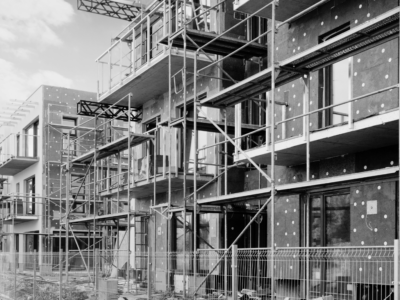We recently waved goodbye to Help to Buy, a flagship government scheme launched by Osborne in 2013 that helped nearly 400,000 first-time buyers to get on the ladder with a total value of £23.6bn.
Risks that the scheme’s resurrection would prove inflationary meant that discussions to bring the scheme back prior to the spring budget did not come to fruition.
Now, just weeks after the scheme’s closure, Rishi Sunak is said to be considering plans to help first-time buyers now that housing has become even more of a key issue ahead of the next general election.
The news comes after Labour’s pledge on April 30 to offer more support for first-time buyers with plans to ensure that the private sector would build at least 300,000 homes a year.
The battle for the title of ‘party of homeownership’ has certainly begun but policies that win versus what the country needs are not necessarily uniform.
A government that boosts homeownership without building social housing may further unsettle Britain’s unstable housing market.
The ever-increasing threat of interest rate increases have made it more challenging for ‘generation rent’ to get on the property ladder, and reports that April saw UK house prices rise for the first time in eight months have done little to boost the confidence of prospective homebuyers in the market.
While we may be waiting until the Autumn Statement for an official announcement of any new scheme to help prospective buyers get on the ladder, reports of the Prime Minister’s plans can perhaps offer a glimmer of light and act as an incentive for future buyers to budget effectively.
How welcome would the support scheme be?
Low deposit products from the government have generally been hailed as a lifeline for first-time buyers who may never have been able to own their own home.
However, critics have said that the schemes does not do enough to help people on lower incomes; that they are responsible for inflating house prices; encourage first-time buyers to take out longer and larger debts on overpriced property; and, that they line the pockets of property developer executives; and, that a return of Help to Buy or the extension of the Mortgage Guarantee Scheme (95 per cent mortgage) could encourage first-time buyers to over-extend themselves at a time when housing markets in Europe are volatile and find themselves in negative equity if property prices fall.
The International Monetary Fund (IMF) warned last week that inflated house prices could cause economic pain if rates keep going up.
Despite this, the return of this scheme could help to maintain the fluidity of new buyers in the market by boosting the number of low-deposit products on the market and help both ‘generation rent’ and housebuilders who have welcome the prospect of the scheme’s return.
The Home Builders Federation, a trade body, said it would be “very supportive” of a new Help to Buy scheme as the increased demand for new builds has directly led to big increases in housing supply, and this is the first time in decades that there hasn’t been a Government support scheme in place for first-time buyers of new builds.
A Government spokesman said:
“Over 400,000 first-time buyers have been helped into home ownership since spring 2010 through Government-backed schemes including Help to Buy and Right to Buy.
We are committed to delivering 300,000 new homes per year and are investing £11.5bn to build the affordable, quality homes this country needs.
We have extended the Mortgage Guarantee Scheme which has already helped over 30,000 households with 5pc deposits onto the housing ladder and we are progressing the Levelling Up and Regeneration Bill to speed up the planning system, cutting unnecessary delays so we can build more homes.”





















Comments